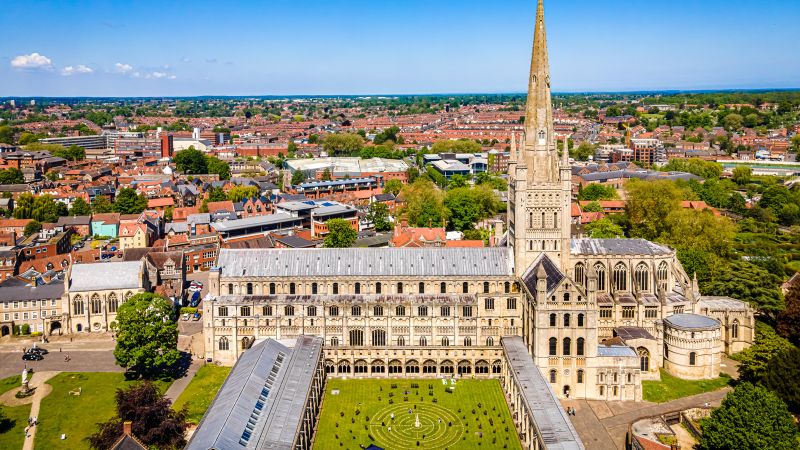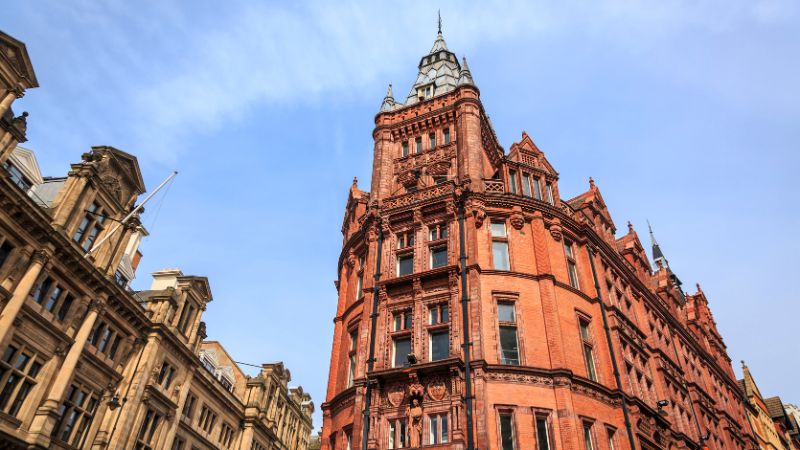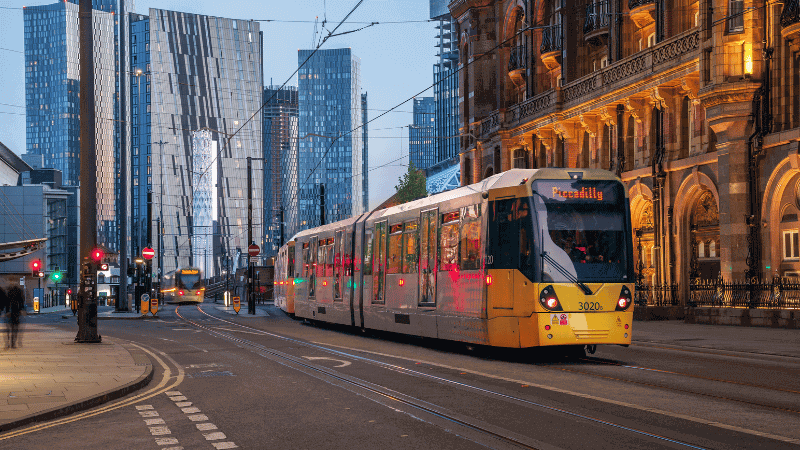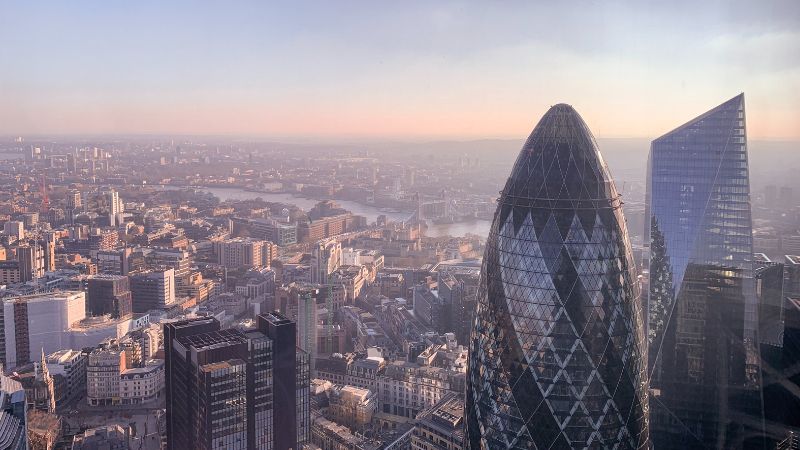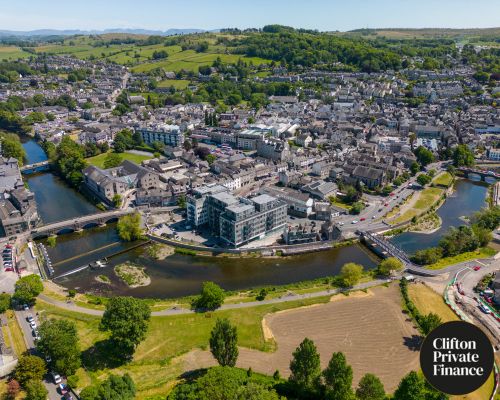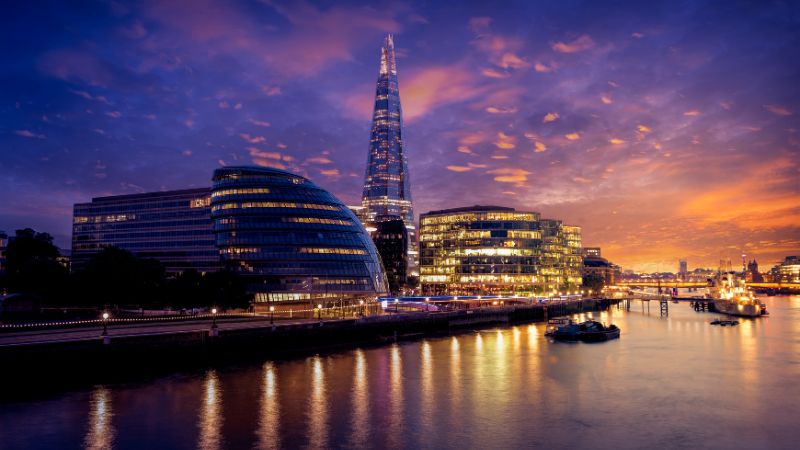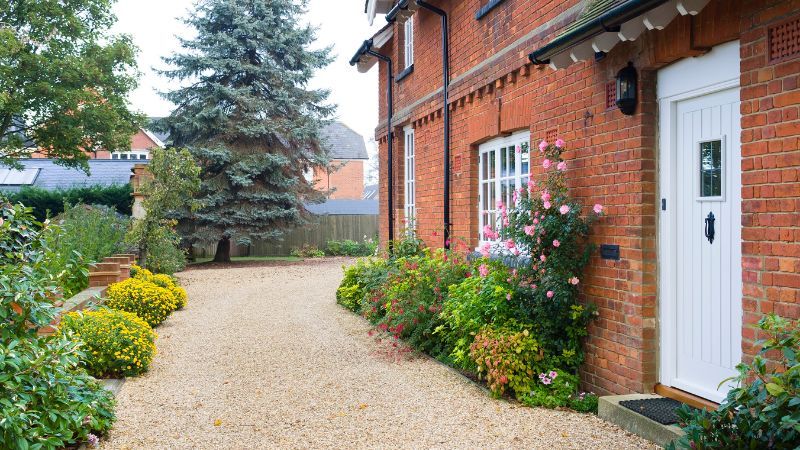Categories
The 9 Best Places to Live in the UK | 2024

Moving to the UK? We've put together a list of the best places to live in the UK if you're an expat or foreign national, rated for affordability, lifestyle, work opportunities and overall happiness.
Moving to a new country is a monumental decision that opens the door to fresh experiences, different cultures, and exciting opportunities. You might be a British citizen returning to the UK after a period of living abroad, or you may be moving to the UK for the first time. Either way, you’re considering the UK as your destination, and the prospect of choosing a suitable city or region to start fresh can be both thrilling and overwhelming.
It’s important to know that the UK is a sovereign state made up of four separate countries: England, Northern Ireland, Scotland and Wales. Each of these countries has a certain level of autonomy and offers its own cultural and historical nuances.
How We've Ranked the Best Places to Live in the UK
The UK offers a variety of landscapes and terrains, from the iconic coloured streets of Notting Hill in London to the rural Cornish coast.
We’ve listed some regions that stand out as the best places to live in the UK. Whether you're looking for cultural hotspots, job opportunities or scenic parks, this blog post aims to guide you through the myriad of possibilities, helping you decide where may be best to begin this new chapter.
See blog: How to Get a UK Mortgage with a Foreign Income
Skip to:
9. Norwich
Norwich boasts a history dating back to the Roman Empire. It’s home to well-preserved medieval architecture, including Norwich Cathedral and Norwich Castle, both prominent British landmarks. The city centre features cobbled streets and a well-preserved medieval layout.
Close by are the picturesque cobbled streets of Elm Hill, synonymous with Norwich's identity. The Sunday Times has voted Norwich one of the best cities to live in the UK three years in a row.
It’s a small city with a flourishing alternative scene, providing a charming mix of independent cafes, shops and local community events.
Stunning rural landscapes surround Norwich, and it's not far from the Norfolk coast. Residents can explore nearby nature reserves and beaches, making it a great spot for hiking, camping and other outdoor activities.
While it’s not the cheapest city in the UK, it provides a pleasant mix of eclectic shops, community spaces and natural scenery, making it a great area to raise a family.
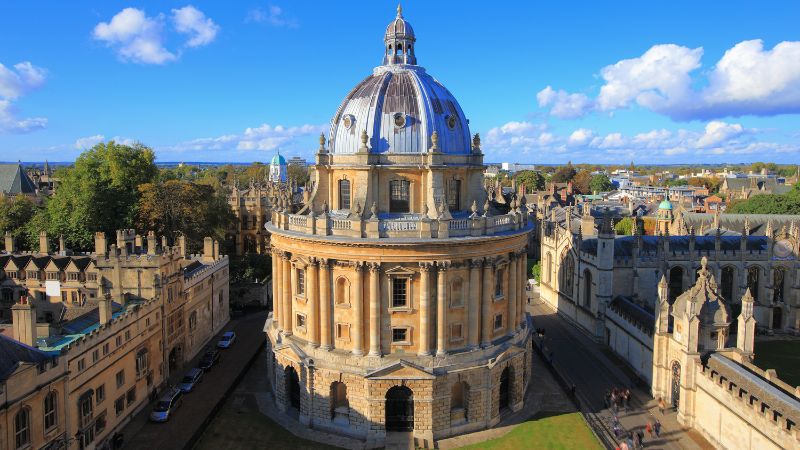
8. Oxford
Oxford is home to the University of Oxford, one of the world's oldest and most prestigious universities. If you are a student, researcher, or academic professional, being part of the academic environment in Oxford can be a significant draw of moving to this small but bustling city.
The city is known for its gothic and baroque architecture and landmarks such as the Radcliffe Camera and the Bodleian Library. The sense of history is palpable, and many of Oxford's landmarks are nearly 1,000 years old.
The Ashmolean Museum, Oxford Playhouse, and the Pitt Rivers Museum are just a few examples of cultural institutions contributing to the city's intellectual and artistic atmosphere. Parks and gardens like the University Parks and Christ Church Meadow provide residents with peaceful places for relaxation and recreation, and the Oxfordshire countryside is nearby.
A certain amount of affluence does come with this rich heritage, and life in Oxford is not cheap. The average house price is £453,200, over £160,000 higher than the national average, potentially due to the large number of Grade II-listed buildings in the area.
However, job satisfaction is especially high in Oxford. It was voted highest for employment rate growth and happiness in 2023. Job opportunities are growing rapidly in Oxford, and many feel the cost of living is worth it to reside in a city that has inspired some of the greatest minds in history.
Read blog: Property Market Update - Buyer Demand 11% Higher in 2024
7. Nottingham
Nottingham has a diverse economy with growing job opportunities in finance, manufacturing, technology, and healthcare. It's a popular student city due to the presence of its two main universities, the University of Nottingham and Nottingham Trent University.
Nottingham is closely associated with the legend of Robin Hood, and Sherwood Forest, located nearby, is a popular attraction. Other popular cultural attractions include Nottingham Castle, which has been a significant structure in the city for centuries, and the Lace Market, which is popular for its well-preserved 19th-century industrial architecture. Once the city's warehouses, these stunning red brick buildings have become gastropubs, trendy offices, and independent stores.
Life in Nottingham is generally considered affordable, and house prices are reasonable. Nottingham’s transport links, cultural attractions and access to parks and green spaces make it suitable for young families. Its combination of student life and local identity provides a down-to-earth atmosphere with plenty to see and do.
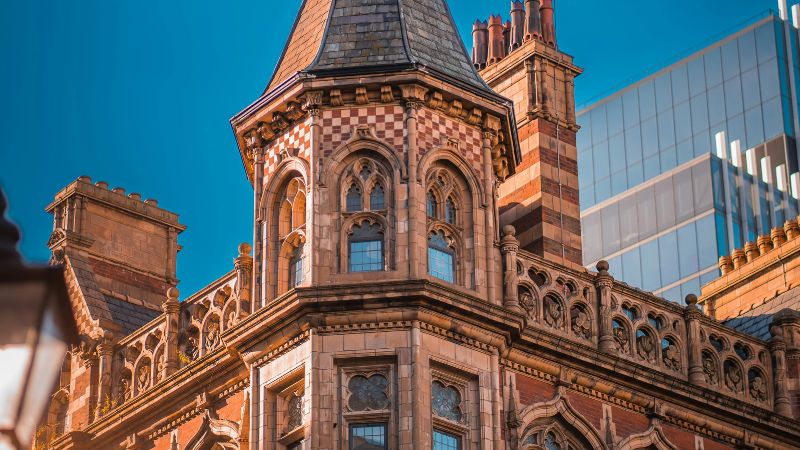
6. Birmingham
Birmingham is the second-largest city in the UK. Its reasonable prices and convenient commuting distance to other cities have made it a popular place to live and work, resulting in a growing economy and a flourishing job market.
Birminham's industrial roots date back to before the 18th century, which is highlighted within Brimingham's iconic Jewellery Quarter. This used to be the centre for jewellery and metalwork, and this history is well-preserved as a thriving entre full of jewellery businesses, museums, and workshops.
While the city has left many culturally relevant buildings intact, it has also embraced modern development. The Bull Ring, for example, is a traditional market building that has been redeveloped into a contemporary shopping centre.
Despite its size, Birmingham is a cheap place to live, with cost-efficient housing choices and a relatively low cost of living. This, combined with its growing industries and convenient transport links, makes Birmingham more popular for property investment.
It has a great food scene, with some of the best international cuisine in the UK. This can primarily be attributed to Birmingham’s culturally diverse population - 51.4% of Birmingham’s population are ethnic minorities.
Birmingham locals are renowned for being friendly, which, combined with the city's large number of international residents, means you won’t find it too difficult to integrate into the local community.
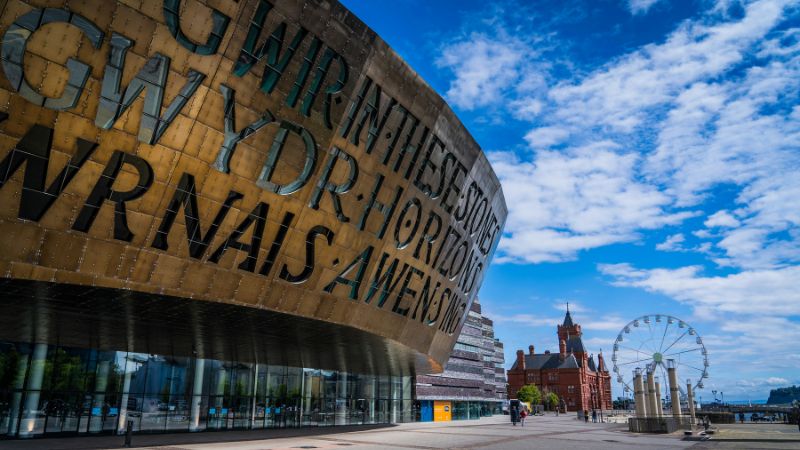
5. Cardiff
The capital city of Wales has a thriving cultural scene with numerous theatres, art galleries, and events. The city hosts festivals and concerts throughout the year, providing ample opportunity for residents to engage with the arts.
By day, the city offers an assortment of cafes, markets, independent shops and mainstream stores. By night, Cardiff has excellent nightlife, with a wide range of pubs, clubs and bars.
One of the key advantages of Cardiff is that it has the positives of a capital city – access to live music, sports events, a growing job market, and international cuisine – without a capital price tag.
As one of the UK’s major cities, Cardiff is a popular tour stop for the world’s biggest music artists, and these gigs are often more affordable than those in London. It holds sporting events and convenient transport links to other large cities like Bristol, Birmingham and Swansea.
As more Londoners find themselves priced out of London, Cardiff is becoming a popular option among professionals due to the presence of BBC Wales and other large companies providing jobs in the area.
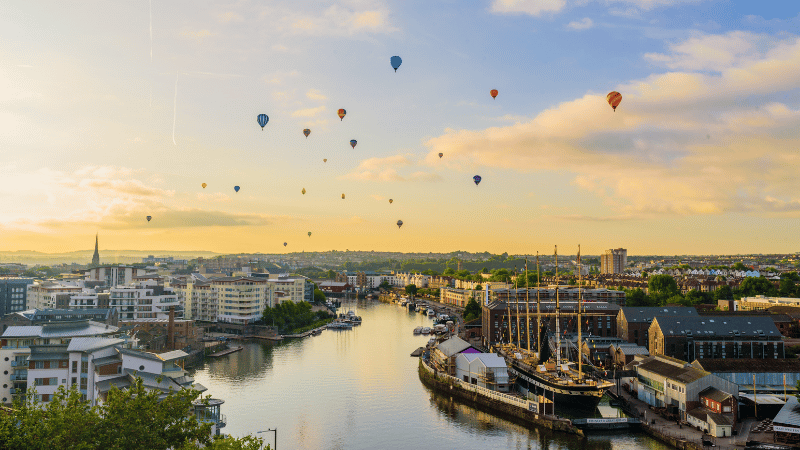
4. Bristol
Bristol is an up-and-coming city in the South West. It's home to beautiful architecture, a chilled alternative subculture, and many growing businesses. Some popular attractions are the city's historic harbourside, Clifton Suspension Bridge, and well-preserved Georgian townhouses.
Bristol’s eclectic community drives a strong sense of community and inclusivity. It has an expanding work economy, especially in aerospace, technology, finance, and the creative industries, offering a myriad of unique work opportunities.
The harbourside has been transformed into a vibrant area with waterfront cafes, restaurants, and cultural attractions. Living near the harborside provides a unique and picturesque urban experience.
Bristol isn’t as affordable as in previous years, but job opportunities are growing across all its sectors, and it is an increasingly popular area for property investment.
It has the advantages of many cities - particularly as a foodie destination and for its music culture – however, like Cardiff, it is relatively walkable, and many of Bristol’s residents choose to cycle. Bristol has convenient transport links to Cardiff, Birmingham and London, making it a great city for commuters.
3. Edinburgh
Edinburgh is a vibrant and culturally rich city attracting tourists from around the world. It’s the epicentre of Scotland’s history - landmarks like Edinburgh Castle pepper the country’s stunning natural scenery. The city’s gothic architecture and moody backdrop have made it a hub for creatives, as seen with Edinburgh Fringe, the largest arts festival in the world.
Edinburgh has a relatively balanced cost of living for a large city, which, combined with the many advantages of a capital city, allows for a good quality of life. The city offers a fairly even balance between urban living and natural beauty. It has green spaces like Holyrood Park and Arthur's Seat, providing opportunities for outdoor activities.
In the historic Old Town and New Town areas, there’s a variety of traditional pubs where you can enjoy a relaxed atmosphere and live music. There are also trendy bars and cafes for those looking for a more contemporary atmosphere. Edinburgh's affordable cost of living, scenic beauty, and activities make it a great city to live and work in.
2. Manchester
Manchester is a major economic and business hub with a diverse economy. The city has a strong presence in finance, technology, healthcare, and the creative industries. Job opportunities are available across various sectors, making it an attractive destination for professionals.
Manchester has long been a hub of music, art, and literature. The city is known for its iconic music venues, including the Hacienda nightclub, and its influence on the Manchester music scene in the 80s and 90s.
As one of the UK’s largest cities, it has a diverse culinary scene - there’s a variety of restaurants, cafes, and street food, with options for all food preferences. Manchester is widely recognised as an influential, exciting and modern city to work or study in.
The Manchester Arndale and the Trafford Centre are popular shopping destinations, with a mix of high-end and affordable stores. It’s lively and affordable, offering opportunities for property investment, nationally renowned food spots and stimulating nightlife.
Manchester is known for its sense of community and resilience, and it’s also one of the most diverse cities in the UK, with over 200 languages spoken there.
And finally...
1. London
London easily takes the crown as the best place in the UK to live and work as an expat or foreign national.
It’s the UK’s most ethnically diverse city, with 10 of its 33 boroughs having a non-white population. Famous for its bustling international population and booming job market, it has even been voted the best city in the world nine years in a row.
Of course, living in the capital comes at a price. Buying a home is increasingly difficult for first-time buyers in London. The average house price is £526,000, £225,000 over the national average.
Barking and Dagenham have been voted the cheapest boroughs to buy property, with an average house price of £345,000. This illustrates that first-time buyers can get on the property market without help, but it may still be a push. On top of this, rent is rising, making the cost of living even more unaffordable for the city's young people and lower-income communities.
But while it might not be a match for someone on a budget, it makes up for it in many other factors. For starters, the average salary in London is significantly higher than in the rest of the UK. With thriving job opportunities in the finance, business and creative sectors, there is certainly money to be made there.
London offers an excellent food scene and a wealth of nightlife and culture – it's a fun and fast-paced city full of possibilities for business, leisure and meeting new people. It offers unlimited trendy bars, top-class eateries, and a thriving underground music scene. The borough of Richmond was voted the happiest area in the UK in 2023.
Read blog: Living in Dubai? 4 Ways a British Expat Can Get a UK Mortgage
Data Table
Here’s some more information on the top cities for expats & foreign nationals that you might find helpful:
|
|
Population |
Average Wage |
Average House Price |
Employment Rate |
|
London |
9.6m |
£44,370 |
£516,000 |
75.8% |
|
Manchester |
2.7m |
£37,500 |
£243,000 |
72.8% |
|
Edinburgh |
554,000 |
£33,540 |
£281,513 |
81.2% |
|
Bristol |
707,000 |
£35,000 |
£365,441 |
82.1% |
|
Cardiff |
488,000 |
£33,492 |
£233,000 |
72.3% |
|
Birmingham |
2.6m |
£35,100 |
£277,000 |
67.3% |
|
Nottingham |
806,757 |
£35,000 |
£238,000 |
65.3% |
|
Oxford |
160,000 |
£30,575 |
£453,200 |
78.3% |
|
Norwich |
143,100 |
£32,000 |
£299,000 |
81.2% |
Looking to buy property in the UK while living abroad? Here are some of the international clients we've helped secure funding recently:



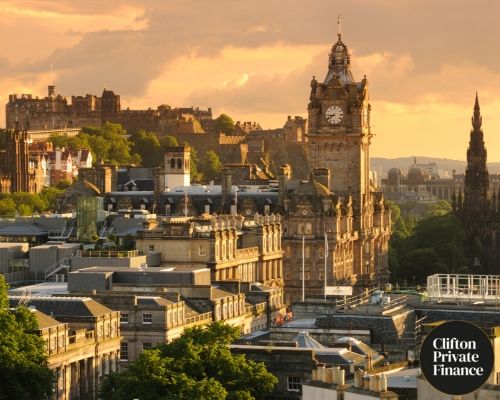

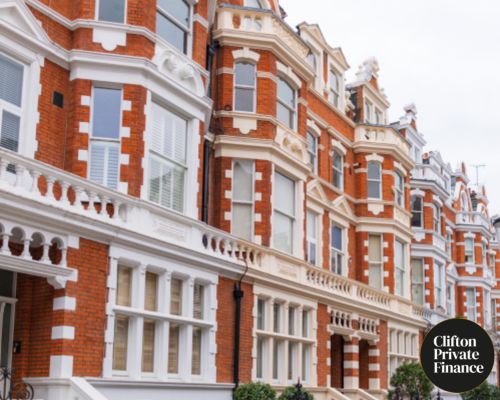
See similar: How to Get a UK Expat Mortgage
Looking to Buy Property in the UK?
If you’re looking to buy a home in the UK as a foreign national or a returning expat, we can help you. You may be living overseas and considering moving to the UK or recently relocated. Either way, securing a home loan in the UK can be challenging for expats and foreign nationals.
We have relationships with high street, private and specialist lenders across the UK and internationally.
At Clifton Private Finance, we have experienced expatriate mortgage brokers with contacts of specialist lenders across the whole expat lending market. Give us a call, and we can suggest some options and a rough idea of what rates you're looking at.
We'll usually get back to you with indicative terms within a couple of days, and our advice is free before you decide to go ahead with us. With expert market knowledge, we can deliver terms tailored to your needs.
Call us at +44 203 900 4322 to discuss your requirements, or you can book a free consultation with one of our expert advisors below.

